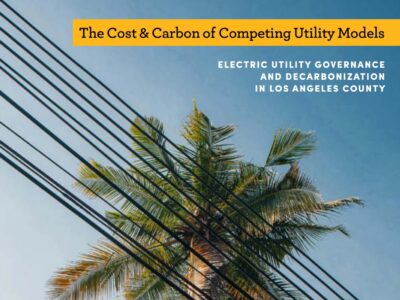Which is Better: LADWP or SCE?
New UCLA Law report, "The Cost & Carbon of Competing Utility Models," contrasts municipally owned electric utilities and investor-owned utilities.
One of our three main areas of focus at the Emmett Clean Energy Law & Leadership (E-CELL) initiative is Ownership of Energy Resources: exploring how utility ownership structures affect cost, climate, and other outcomes. In June, we released a Pritzker Brief on this topic co-authored by our recent legal fellow, Ruthie Lazenby, as well as Mohit Chhabra of NRDC and Sylvie Ashford of TURN. That paper explored the theoretical underpinnings differentiating between publ...
CONTINUE READINGRevoking Monuments?
Recent Justice Department memo on National Monuments argues for Presidential power to eliminate them entirely
National monuments were a major flashpoint for public lands management under the first Trump Administration, which dramatically shrank two national monuments in Utah. I think there was a broad expectation that the second Trump Administration would do the same, but for more monuments (including those designated under the Biden Administration), but so far not much has happened. One possibility is that the Trump Administration is hoping that litigation challenging the A...
CONTINUE READINGArson Alone Does Not Explain the Palisades Fire
The Drain is a weekly roundup of environmental and climate news from Legal Planet.
When federal prosecutors charged a man last week with intentionally starting a brushfire that was suppressed but smoldered and ultimately became the Palisades fire, arson became the focus of attention all week. The city’s after-action report about the fire was totally overshadowed by questions around the suspect. What was his motive? Is there strong evidence? It’s almost as if arson became the sole explanation for one of the state’s most destructive fires. T...
CONTINUE READINGLearning from the Laureates
The 2025 Economics Prize, Technological Innovation, and the Energy Transition
This year’s Nobel Prize in Economics was split among three economists for their work on technological innovation and economic growth. Their work doesn’t focus on energy or the environment, but it has important implications regarding the energy transition. In particular, it raises serious concerns about the long-term impact of Trump’s energy policies and his vendetta against renewable energy on U.S. economic growth. Half of the prize was split between Philippe Ag...
CONTINUE READINGHow broad does Clean Water Act 401 certification sweep?
Recent disputes over infrastructure projects highlights the importance of the question
Another issue for ping-pong governance over the past few years has been certification under Section 401 of the Clean Water Act. For those of you who are not deep into the weeds of the Clean Water Act, Section 401 requires (a) federal agencies that are issuing licenses or permits that (b) result in discharges to waters of the United States to (c) receive a certification from the state the discharge is located within that (d) the discharge will not cause a violation of v...
CONTINUE READINGThe Dark and Quiet Skies Campaign
What does Space Law have to do with environmental law? Satellites pollute in more ways than you think.
When you walk outside at night, do you ever wonder how many stars you can see? For most of human history, this would have been a foolish question. The night sky was filled with stars. Today, though, in any major city you may be lucky to see only a handful. For years, astronomers have warned that we are losing the night sky to terrestrial light pollution. In just the past decade, though, this concern has shifted from the Earth’s surface to space. The remarkable r...
CONTINUE READINGA Rock and a Hard Place
Reform of hard rock mining law is important to both protect the environment and ensure we have access to critical minerals
One issue that has come up in recent permitting reform proposals, including the Bipartisan Problem Solvers Caucus proposal that I discussed recently, is how we regulate mining on federal lands. Much of the minerals production in the United States occurs on federal lands, and that includes much of the critical minerals such as rare earths that are required for sophisticated computing technology, batteries, and renewable energy production. The issue is that hard rock ...
CONTINUE READINGThe War on Public Health Continues
Friday’s layoffs announcements at CDC targeted infectious disease control
During the COVID outbreak, President Trump said, “If we stopped testing right now, we’d have very few cases, if any.” That philosophy seems to have taken hold during his second term in office. On Friday, the Administration sent out notices that it was firing more than a thousand CDC workers, including the scientists and doctors who provide key information and expertise about infectious disease outbreaks. Among those receiving the notices were the members of th...
CONTINUE READINGProblem solved?
Bipartisan proposal for permitting reform from Problem Solvers Caucus is a good first step, but has much more work to do
The permitting reform conversation continues in Congress – this time with a long set of proposals from the bipartisan Problem Solvers Caucus, based on a range of conversations with different stakeholders and interest groups. There is much that is good in this set of proposals, but there are also proposals that require more thought, or miss the mark. And for many of them, whether they are beneficial (or not) will depend a lot on the details. In this blog post, I�...
CONTINUE READINGTake Two
Trump Administration reasoning around the definition of take appears contradictory
I’ve written before about how the Trump Administration is proposing to eliminate the definition of “harm” in the Endangered Species Act (ESA) regulations – an action that could remove protections for endangered species from habitat modification. The main justification that the Administration is relying upon in the proposal is a claim that the best interpretation of the meaning of the term “harm” in the ESA is Justice Scalia’s dissent in the Supreme Court�...
CONTINUE READING








